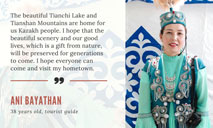A date with China: Ruiquan tea museum displays Fujian’s intangible cultural heritage
Located among the tea bushes in the midsts of Wuyi Mountain in east China's Fujian Province, Ruiquan museum gives a taste of the distinctive tea culture rooted in Fujian's past.
In the scenic setting of the lush, dark green countryside, visitors can observe some of the old methods of tea production, such as cooling, stir-fry and kneading. Visitors can also see first-hand some of the equipment used in the tea making process, such as metal basins for frying tea leaves and wicker baskets for drying the leaves.
Huang Shengliang is a national cultural skills inheritor of Wuyi rock tea at Ruiquan. He gave his view on the role of tea as a cultural practice in the present day.
Although drinking tea is an old custom, he says, it still maintains its appeal as a mode of relaxation.
"Even though the pace of the lifestyle is pretty fast right now, people sometimes prefer to slow down and enjoy life a little bit," he said.
Asked about distribution of interest in tea among generations in China, Huang noted that while in his opinion, people will become more interested in tea as they grow older, the reputation of rock tea at Wuyi Mountain has drawn many young apprentices interested in learning the process of tea making to his workshop. His youngest apprentice is just 19 years old.
But the appeal of the tea here is not limited to cultural heritage or taste, as the tea farms around Wuyi Mountain are maintained under rigorous environmental policies aimed to promote ecology.
At Yanzike tea farm near Wuyi Mountain, the quality of the tea has been improved through scientific fertilizing methods and ecological prevention and treatment.
The area around Wuyi Mountain is particularly famous for its rock tea, also known as 'dahongpao' (big red robe), so named for its distinctive shape and orchid-like fragrance.
The tea has a light orange colour when poured into a cup, and compared to to other tea can retain its favour for nine steepings.
Just as the tangled strips of rock tea grown near Wuyi Mountain knot, twist and turn after being dried out in the sun, so the tea culture in Fujian has experienced various changes in its history. Nonetheless, this intangible cultural heritage is a common thread which has played a role in the lives of countless generations in Fujian.
Photos
Related Stories
Copyright © 2021 People's Daily Online. All Rights Reserved.










